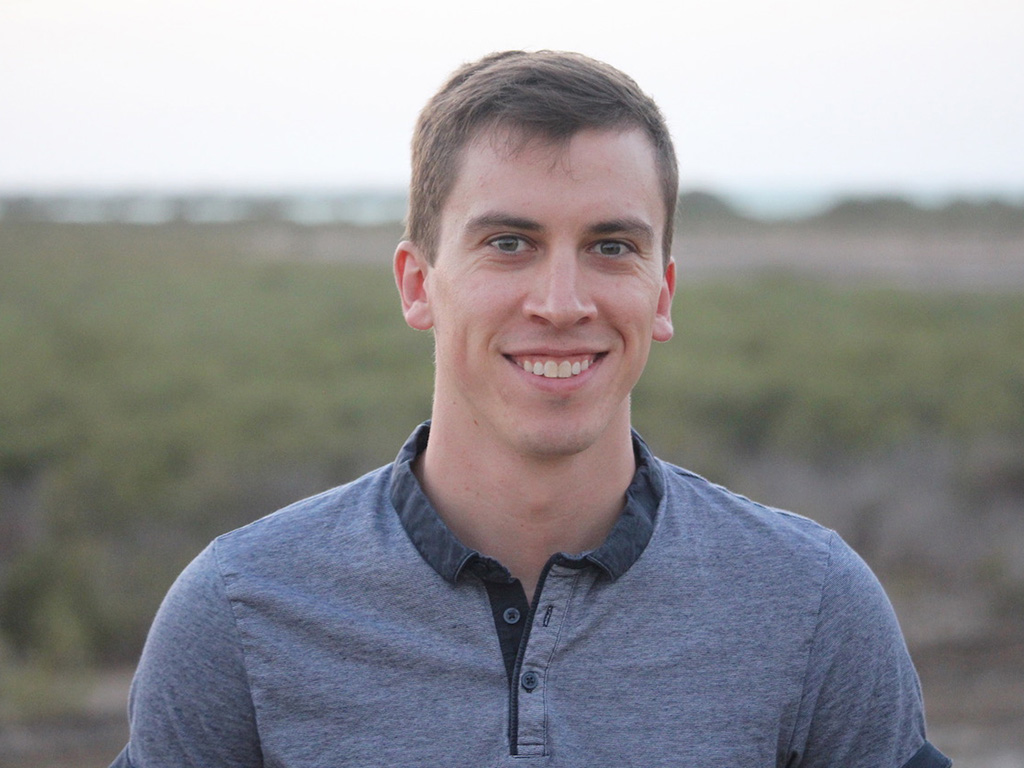
Tom DeCarlo.
HPU Professor of Oceanography Thomas DeCarlo, Ph.D., was recently awarded a prestigious five-year $450,000 grant from the National Science Foundation (NSF) to help revolutionize the field of coral core analysis.
The NSF Faculty Early Career Development Program (CAREER) grant is awarded to university faculty members who have shown significant early-career potential to serve as academic role models in research and education. The grant will provide financial support for two HPU graduate students per year, and several internships and paid positions for HPU undergraduate students.
The primary objective for DeCarlo and his team of scientists is to create the world’s first virtual coral core repository called “Coral Cache.” This groundbreaking online coral repository will be free for anyone to access and will house a database to store all new and existing coral growth rate data. The database will serve as a platform for global growth analysis and will be the standard for post-publication data sharing in coral core studies.
A coral core is a natural time capsule that contains records of local pollution, water chemistry, temperature, and reef health spanning hundreds, or even thousands of years. A key facet of this area of study is that corals secrete alternating bands in their skeletons every year, much like tree rings.
“My goal with the CAREER grant is to make analysis of coral growth rates a community endeavor, with participation of scientists and the public,” said DeCarlo. “Hundreds or thousands of coral cores will be available in the Coral Cache repository. It will enable anyone with a computer to open a core, click on the annual bands and identify them. Potentially hundreds of people can analyze a core and crowdsource the data. A public consensus of the core begins, where people will be able to investigate the cores on their own and share their data, working together around the world as a public resource.”
DeCarlo has spent a significant part of his career studying and collecting coral cores. He has collected hundreds of samples from around the world and he plans to collect a new set of well-replicated, century-long coral cores in Hawai‘i. These cores, and a host of other coral cores from around the world, will be CT-scanned at Adventist Health Castle Medical Center, and the images immediately shared on Coral Cache.
A long-term goal for the grant is to involve HPU computer science students to design an educational game around the coral CT scans that will be available to classrooms anywhere in the world with an internet connection.
“The computer game will be called ‘Coral Clues’ and it will be used in the classroom setting,” said DeCarlo. “Teams can compete with other classrooms across the globe. It will be designed for high school students and college students.”
During DeCarlo’s Ph.D. work at Woods Hole Oceanographic Institution he developed a computer program called “Coral CT” to observe corals in 3D, enabling a person to reconstruct the growth pattern of a coral and have a more accurate representation of how a coral grows. With funds from the NSF CAREER grant, DeCarlo will continue expanding Coral CT to include new species of coral.
Grant funding will also be used to purchase a state-of-the-art 3D hologram projector where students can visualize coral skeletons, or coral reefs, outside of the computer screen, growing in three dimensions, allowing a person to truly imagine how coral structures grow in the natural world.
“We hope to create coral holograms to demonstrate corals at local K-12 schools in Hawai‘i,” said DeCarlo. “We essentially want everyone at all ages to see and understand what makes corals so vital to the environment and visually stunning to observe.”
DeCarlo teaches in the department of natural science at HPU’s Makapu'u and Hawaii Loa Campuses. He runs the HPU Sclerochronology lab, with research focusing on unraveling the ocean’s past and addressing how changes in our ocean influence the functioning of precious coastal ecosystems. He received his Ph.D. from Massachusetts Institute of Technology/Woods Hole Oceanographic Institution and joined the faculty at HPU in 2020.


